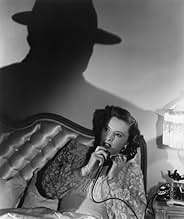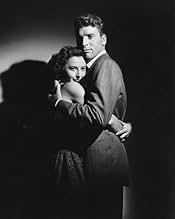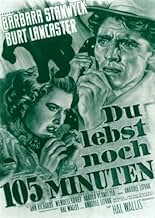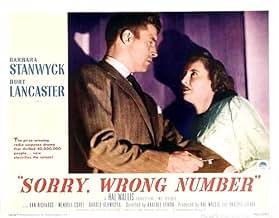अपनी भाषा में प्लॉट जोड़ेंWhen neurotic bedridden wife Leona Stevenson overhears a murder plot on her telephone, she tries to piece the puzzle together and prevent the murder. Based on Lucille Fletcher's famous radio... सभी पढ़ेंWhen neurotic bedridden wife Leona Stevenson overhears a murder plot on her telephone, she tries to piece the puzzle together and prevent the murder. Based on Lucille Fletcher's famous radio play.When neurotic bedridden wife Leona Stevenson overhears a murder plot on her telephone, she tries to piece the puzzle together and prevent the murder. Based on Lucille Fletcher's famous radio play.
- 1 ऑस्कर के लिए नामांकित
- 3 जीत और कुल 3 नामांकन
- Page Boy
- (बिना क्रेडिट के)
- Police Sergeant Duffy
- (बिना क्रेडिट के)
- Cotterell's Blonde Girlfriend
- (बिना क्रेडिट के)
- Clam Digger
- (बिना क्रेडिट के)
- French Maid
- (बिना क्रेडिट के)
- Cigarette Girl
- (बिना क्रेडिट के)
फ़ीचर्ड समीक्षाएं
Stanwyck is excellent as the spoiled, arrogant, and wealthy, but, ultimately, helpless heroine of Lucille Fletcher's adapted radio play (the part was originated on radio by Agnes Moorehead). The story picks up some flaws in its extension into a feature film; it is most frustrating as (flashbacks) ((within flashbacks)) (((within flashbacks))) occur; and, the story becomes a little confusing. Still, Stanwyck's fine performance carries the film to an exciting, tense, conclusion.
******** Sorry, Wrong Number (9/1/48) Anatole Litvak ~ Barbara Stanwyck, Burt Lancaster, Wendell Corey
The idea of only gradually revealing why Leona is being set up for murder is a good one. It adds to the suspense—not just a 'when' but also a 'why'. The trouble is the disclosure is only revealed in pieces over the phone using flashbacks, and these are hard to piece together over a stretch of time. But enough comes through that we get the idea. There's some great noir photography from Sol Polito that really adds to the tense atmosphere. Anyhow, it's a great premise that also played well over the radio that I recall as a kid. It's also a subtle irony that one could end up being so alone in the middle of a great city. Poor Leona, maybe if she had been a little nicer and less bossy over the phone, she might have made the human connection she needed.
You can tell this thriller was once a radio play--it is mostly talk, and often over the telephone. But what drama can be built on a string of conversations around the office, in cars in the rain, out on a lonely beach on Staten Island, and on the telephone, often filled with mystery and doom.\
Not that it's not a visual movie, either. There is a big gloomy house, and lots of dark city streets. Shadows and moving camera and close-ups of faces and telephones, all keep you glued and increasingly worried. By the end, the really jarring, memorable end, you are ready for what you can never be ready for.
Beware, the plot is confusing. Even seeing it twice I had to pay attention to who was who, and what turn of events had just taken place. Part of the reason is there is a bewildering use of flashbacks, even flashbacks within flashbacks, told by all kinds of different characters. The plot is laid out methodically, but take notes as you go, or at least take note. The initial overheard phone call is key to it all, and it gets reinforced later somewhat, but pay heed there.
And the person on the phone? A sharp, bitter, convincing Barbara Stanwyck, who really knows how to be steely and vulnerable at the same time. Burt Lancaster is more solid and stolid, and maybe less persuasive overall, but he carries a more practical part of the story. It keeps coming back to Stanwyck in bed, and the telephone which is her contact with the facts, as they swirl and finally descend.
Director Anatole Litvak has some less known but thrilling dark dramas to look for, including Snake Pit. But this is his most sensational winner, partly for Stanwyck, and partly for the last five minutes, which is as good as drama gets.
Trivia note: The only other film with such heavy use of flashbacks to tell a complicated story is THE LOCKET ('47), but it was done more efficiently than it is here.
क्या आपको पता है
- ट्रिवियाAnatole Litvak: Where Henry is having lunch with Sally, he asks his waiter if he knows who the gentleman is in the dark glasses at the table behind him. It is the director.
- गूफ़Twice, Leona turns on a radio, and music begins instantly and strongly. Radios of the film's era contained vacuum tubes that needed some time to warm up.
However, this would be filmmaker's prerogative, not wanting to slow the pace of the film with extended silence.
- भाव
Henry Stevenson: [to Leona] I want you to do something. I want you to get yourself out of the bed, and get over to the window and scream as loud as you can. Otherwise you only have another three minutes to live.
- क्रेज़ी क्रेडिटPROLOGUE: "In the tangled networks of a great city, the telephone is the unseen link between a million lives...It is the servant of our common needs-the confidante of our inmost secrets...life and happiness wait upon its ring...and horror...and loneliness...and...death!!!"
- कनेक्शनEdited into Dead Men Don't Wear Plaid (1982)
टॉप पसंद
- How long is Sorry, Wrong Number?Alexa द्वारा संचालित
विवरण
- रिलीज़ की तारीख़
- कंट्री ऑफ़ ओरिजिन
- भाषा
- इस रूप में भी जाना जाता है
- Al filo de la noche
- फ़िल्माने की जगहें
- हॉलीवुड, कैलिफोर्निया, संयुक्त राज्य अमेरिका(telephone switchboard at a telephone company office on Gower St.)
- उत्पादन कंपनी
- IMDbPro पर और कंपनी क्रेडिट देखें
बॉक्स ऑफ़िस
- दुनिया भर में सकल
- $1,974
- चलने की अवधि1 घंटा 29 मिनट
- रंग
- पक्ष अनुपात
- 1.37 : 1
इस पेज में योगदान दें





































